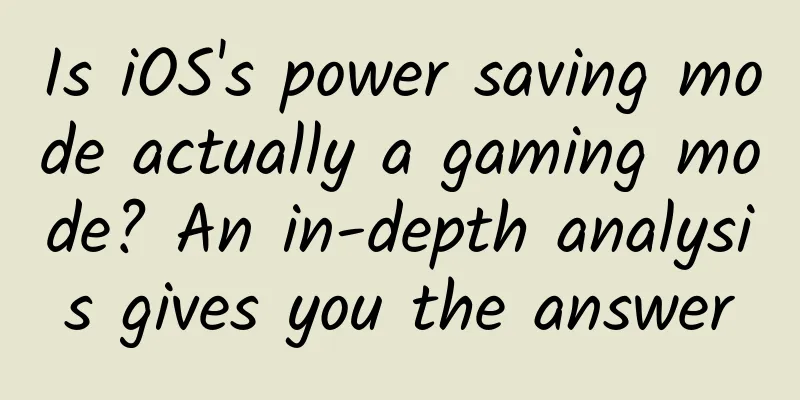Is iOS's power saving mode actually a gaming mode? An in-depth analysis gives you the answer

|
Maybe many Apple fans didn't pay attention to this detail. Starting from A14, the term "power saving mode" has changed. In the past, we would only turn on the power saving mode when the battery was in a critical condition, temporarily reducing the performance and power consumption of the mobile phone to extend the battery life of the mobile phone. Nowadays, iOS's power saving mode has become a game mode. When playing some large mobile games in power saving mode, the stability of the game frame rate is better than in normal state - this is the unknown hidden trick of iPhone. The question is, why do people in the know recommend playing games in power saving mode? Here we need to focus on explaining what exactly the power saving mode has changed. The nature of power saving modeTo understand iOS's power saving mode, we must first grasp its essence: reducing the power consumption of the entire hardware. After turning on the power saving mode, the phone first reduces "non-essential" power consumption in the system. For example, the screen brightness is reduced, the background app is stopped from refreshing, and the email is stopped from refreshing. You can understand it this way: after turning on the power saving mode, the system will consider the current battery life to be of higher priority than everything else, and no APP will be allowed to occupy resources and affect this goal. The same is true for Android's game mode. Games have the highest priority, and all irrelevant apps are not allowed to occupy resources in the background. Even push notifications are not allowed. After turning on the power saving mode, the power consumption of the whole machine is reduced, and the heat dissipation pressure is also reduced a lot. We all know that Apple's A series chips are the best in the industry, but they are only held back by the iPhone's perfunctory heat dissipation. Because of this, the power saving mode actually improves the gaming experience. Focus on GPU performance schedulingIn addition, the iPhone's power saving mode has another feature: it is very aggressive on CPU performance, often cutting performance in half, but it is timid and does not dare to hit the GPU hard. Here I took two mobile phones for testing, and the comparison is very obvious. In normal state, the GB5 running score of iPhone 11 is 1306, 2971. After turning on the power saving mode, the running score is 798, 1335, which is basically less than half of the original. However, the GPU is different. In normal state, it is 7673, and after turning on the power saving mode, it is 5712, which is only less than 30% lower. This trend is even more obvious after the iPhone 13 turns on power saving mode. The CPU single-core performance dropped from 1710 to 726, and the multi-core performance dropped from 4513 to 3484. This time, the CPU single-core performance was further reduced to only 42% of the original, but the GPU performance was only reduced by less than 30%. In the words of the PC circle, Apple's power saving mode is a typical "low U and high graphics" mode, which is naturally designed for playing large-scale games. Even if the power saving mode is turned on, Apple will put as many resources as possible on the GPU. This is also an important reason why the power saving mode is a gaming mode. 5nm low-frequency energy efficiency is greatly improvedMany people say that TSMC's 5nm process has a small "performance bonus", but this statement is only half right. At high frequencies, the improvement of 5nm is indeed not as expected. However, at medium and low frequencies, the energy efficiency improvement of 5nm is huge. According to Geekbay data, the power consumption of A15 in power saving mode is only 46% of that in normal state, but the performance is 69% of that in normal state, and the "input-output ratio" has increased by 52%. It should be noted that except for monsters like Bright Mountains, most mobile games cannot challenge the limits of A15, and 70% of its power is enough. There is another detail. When the Snapdragon 8Gen1 is running, the GPU peak power consumption can reach more than 11W at one point, while when the iPhone 13 is in power saving mode, the maximum GPU power consumption is only 3W. With such a huge gap, even if the iPhone does not have any cooling measures, it can still provide a good gaming experience. For this reason, after turning on the power saving mode, the iPhone 13 has a more stable gaming experience because the heat dissipation pressure is suddenly reduced. Finally, let’s make a summaryTo summarize briefly: after turning on the power saving mode, the iOS system reduces non-essential functions and reduces the power consumption of the phone; the performance scheduling is "low U and high display", which is very suitable for playing games; TSMC's 5nm has greatly improved energy efficiency under medium and low frequency loads, and the heat generation is reduced, solving the pain point of poor heat dissipation of the iPhone. At this point, I believe everyone understands why the power saving mode is called the game mode by those who know the industry. Have you learned this unknown hidden trick of the iPhone? |
<<: B-side decision-making product design guide: task interruption backtracking design
>>: How Google's Universal Search Ranking Works: Search Is Much More Than PPC
Recommend
Frequent illness vs. no illness, who has a stronger immune system? Let's talk about immunity
This week is "World Immunization Week" ...
A very cool strategy for the top fund players, a 21-day practical training camp course
A very cool strategy for the number one fund playe...
APP operation: How to operate the four life cycles of a product
Having been engaged in operations for so long, I ...
Are today's big brands still using animal butts to make perfumes?
Have you ever smelled musk? There is a good chanc...
Take stock of the flowers that bloom on summer nights and smell their fragrance to cool off
Produced by: Science Popularization China Author:...
Weird Talk | The ordinary Bermuda Triangle became so terrifying because of "it"
Hello everyone, today I will continue to bring yo...
A collection of 10 classic cases of growth hacking, including To C and To B
Since Sean Ellis proposed the concept of Growth H...
For information flow promotion, which channel is currently having the best effect?
2016 is the explosive year for information flow a...
3 creative strategies to make your product counterattack "short, flat and fast" to capture users
If you are "unfortunate" enough to oper...
China Association of Automobile Manufacturers: Brief analysis of passenger car production and sales in October 2021
According to statistics and analysis by the China...
7 ways to express your love to developers on Valentine's Day
[51CTO.com original article] Spring is coming. Wh...
Will QQ red envelopes be able to stop Alipay’s counterattack?
In just over 30 days, it will be the Chinese New ...
Mi Meng appeared, and her fellow journalists stood up for her. They told some truths about self-media operations.
When talking about Mimi Meng and Uncle Tongdao , ...
Baidu Map Marketing allows customers to find you at a glance!
Baidu map marketing uses Baidu maps as a display ...
Can you subdue a crocodile by pinching its mouth with one hand? Why don't you go to heaven!
What? Last time there was a news report about a c...









